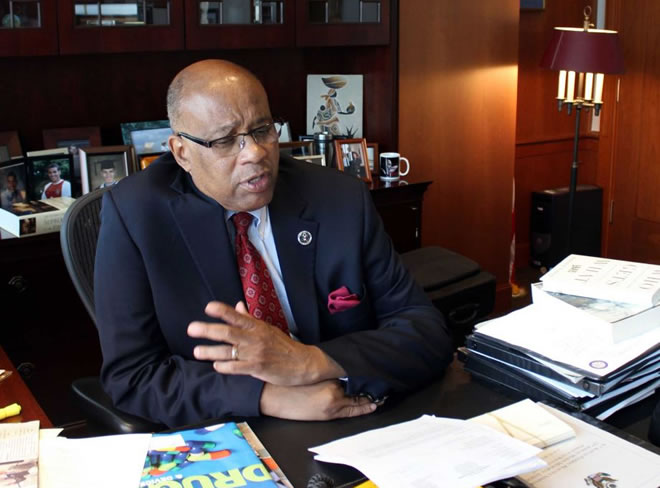
Friday, July 31, 2015

The 6-foot-5 Davis, who can make defendants fidget with his long, drawn-out silences, stressed the gravity of the charges and tried to gauge whether this particular young man was truly dedicated to jihad or simply misguided and a possible candidate for rehabilitation.
Federal judges in Chicago, New York and other U.S. cities typically take a hardline approach to terrorism suspects, locking them up after hearing from prosecutors that these men and women have embraced violent ideologies and are a threat to national security. But Davis — who's handled all of the recent terrorism cases in Minnesota, where a large Somali community has been a target for recruits for the Islamic State group and al-Shabab — takes a nuanced approach. He's considering pretrial release for some, asking attorneys and the community to create plans that will keep the public safe and steer the young men in a positive direction. As dozens of similar cases proceed nationwide, Davis' actions could become a model for other courts, or could prove disastrous if he takes a risk on the wrong person.
"I think he's been able to see that terrorism cases aren't black and white and there's a lot of grey in there," said Anders Folk, a former federal prosecutor in Minnesota who said Davis is among the most experienced judges in the country on the topic.
Davis doesn't talk about active cases but said during a recent hearing: "This is way too important for us just to treat it as a regular criminal case."
The first African-American federal judge in Minnesota has a broad, friendly smile that he uses to put jurors, and sometimes defendants, at ease, but he also employs a stare that flusters even the most experienced attorneys. He's soft-spoken, but can command attention with a big, booming voice. The 68-year-old has no tolerance for disruptions in the courtroom, but is well known for ensuring each person receives equal justice.
Cases like the ones currently in front of Davis — eight young men charged with conspiring to travel to Syria to join the Islamic State group — are challenging for any judge, Folk said. They're complex and require managing a community that's emotionally involved and sometimes feels unfairly targeted.
Davis, who also served on the U.S. Foreign Intelligence Surveillance Court before and after Sept. 11, appears to understand how his actions reverberate: He takes pains to explain the legal process, calling parents to the podium to ensure they comprehend, and addresses each defendant directly — something Somali community members respect.
"He's shown that he really understands the quagmire, or the situation, the families are facing when he invited all of them to come forward and talk to them," said Mohamud Noor, a Somali community advocate. "When he talks directly to the families, when he talks directly to the kids, they get it."
Over the years, Minnesota officials have developed a feel for who these defendants are, said Karen Greenberg, director of the Center on National Security at Fordham Law School. "The more nuance that the criminal justice system can introduce into how it thinks about all of these cases instead of lumping them all together, the better," she said.
Davis has granted pretrial release for terror defendants before — and swiftly revoked it when conditions were violated. The plans he's now asking defendants to create include a mix of religious counseling, mentoring and other guidance.
"I'm just not sending someone to a halfway house ... sending a person to a home with a monitor, it just doesn't work," Davis said during one hearing. "I need your help. I need the community's help."
He also signaled this month that he's thinking about the larger problem of radicalized youth. He gave attorneys research about programs in other countries designed to keep terror suspects from engaging in violence, and said coming up with something similar would be a "worthy goal."
The decisions being made by Davis, whose early career included helping underserved communities, are no surprise to friends and colleagues. He gives people hope and has a reputation for treating each defendant as a human being, U.S. District Judge Donovan Frank said.
"People may not always believe in the decision ... but can tell someone really cares," Frank said.
A few years ago, Davis held one terror defendant in contempt every time she refused to stand. But when he heard later that she wasn't allowed to wear her religious head covering in jail, Davis helped find a solution, according to her attorney, Dan Scott.
"He will move heaven and earth when he thinks there's something wrong," he said.
Before his federal bench appointment in 1994, Davis was a public defender, then a state judge. He became Minnesota's chief judge in 2008, and recently stepped down from that post. He plans to keep all his current cases.
In what might be a clue as to how Davis views his role, a picture of his hero, former Supreme Court Justice Thurgood Marshall, hangs in his chambers. It includes this quote: "The legal system can force open doors, and, sometimes, even knock down walls. But it cannot build bridges. That job belongs to you and me."